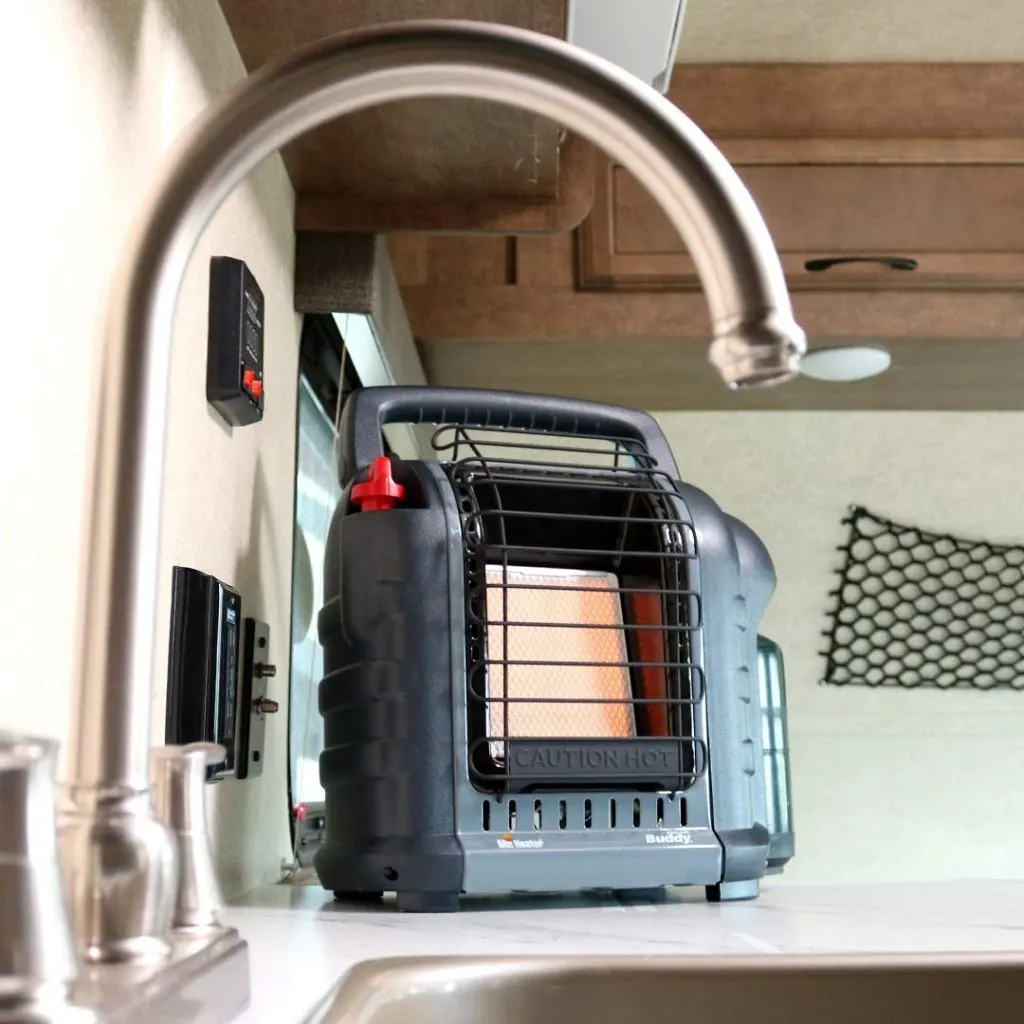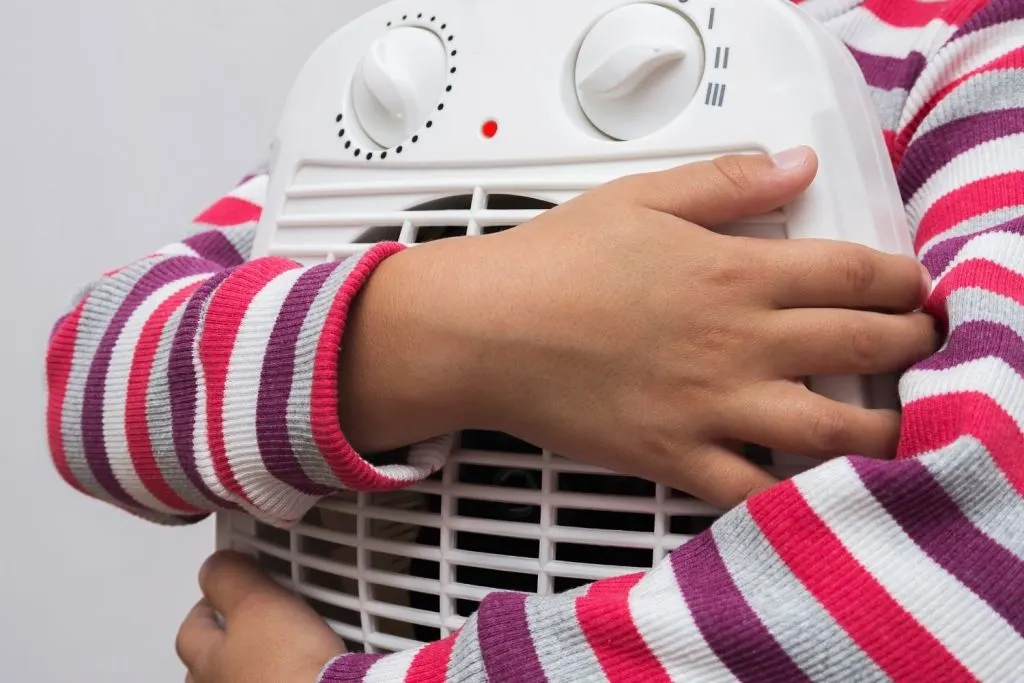Winter is coming! But, don’t let it scare you away from an awesome camping trip. Heating your RV camper is easier than you may think.
And fortunately, there are a lot of different ways to make your home on wheels feel toasty.
Today we’re sharing the 5 most effective ways to heat your RV this winter.
Let’s dive in!
Winter RVing Can Be Enjoyable With The Right Preparation
With the right preparation and heating equipment, winter RVing can really be enjoyable. No, you won’t just be freezing the whole time.
Your RV can be as comfy and cozy as a house, even in the coldest of weather.

5 Ways to Heat Your RV This Winter
RV Propane Furnace
Your RV or camper should be equipped with a propane furnace. This can be a ducted unit with vents in each area of the trailer, or it may be a simple wall unit with one output.
You light the furnace pilot, and there is usually a thermostat that controls it turning on and off.
RV Propane Furnace Pro: you can use the furnace anywhere you camp, even without electricity.
Propane Furnace Cons: you can go through quite a bit of propane when it’s cold out. Also, it can be difficult to get the pilot lit when it’s windy… Make sure you have a wind block handy! Even if it’s just your travel partner or camp neighbor.
Propane Space Heaters
Propane space heaters work like any other space heater, except they are powered by propane. A familiar brand is Mr. Heater Indoor RV Portable Buddy Heater. These are incredibly popular heaters for RVers and campers and put out a significant amount of heat.
Make sure you are familiar with your propane space heater. Some require venting, as they produce deadly carbon monoxide gas. However, if you have adequate ventilation and a C02 alarm, this heater might be perfect for you!
Propane Space Heater Pros: they work without electricity, and you can use them indoors or out. Also, these heaters put out tons of targeted heat!
Propane Space Heater Cons: You need to ventilate with most propane space heaters, and always have a C02 detector handy. (But you should have that anyway!) Also, some propane space heaters don’t work well in high altitudes.
Lastly, propane heat is a wet heat. This means it causes lots of condensation which could lead to mold issues if not dealt with.

Pro Tip: RVs develop a lot of condensation in the winter, especially using propane heat. Check out these portable RV dehumidifiers to battle the moisture and prevent mold!
Diesel Air Heater
Diesel air heaters are heaters that you install in an RV or camper, and they are very popular with skoolie and campervan conversions. It seems like these heaters are taking the camping world by storm!
Brand name diesel air heaters will run you close to $1k. But there are many generic brands out there for around 20% of the brand name price.
Diesel Air Heater Pros: These heaters produce a dry heat, so you avoid some of the condensation problems from propane. Also, they heat a lot, and quickly. These heaters are fuel efficient and can be left running while you’re gone, so your camper always stays cozy!
Diesel Air Heater Cons: Brand name diesel heaters aren’t cheap. They also require a slightly extensive installation process that includes cutting holes for the exhaust. But there are plenty of YouTube videos to lead the way! Or you can always hire someone to do it for you.
Mini Wood Stove
A mini wood stove is just what it says, a tiny stove that burns small chunks of wood… super cozy! Mini wood stoves are also gaining popularity in skoolie conversions, van builds, and campers. Here are the pros and cons of these cozy little heaters.
Mini Wood Stove Pros: Wood stoves are cozy and give a great ambiance. They produce a dry, radiant heat. The only thing you need for a wood stove is wood, and you can find that anywhere.
Mini Wood Stove Cons: You have to either keep dry wood handy, which takes up room. Or, you need to source it every time you need it. These stoves can be messy with the ash. Also, you have to continuously feed the fire. Since the stoves are small, you have to feed it more often to keep the heat going. Finally, wood stove installation is very involved and requires cutting a hole in your RV for the chimney.
Electric Space Heaters
Electric space heaters are your run of the mill indoor space heaters. There are different sizes, shapes, and styles of these heaters. Some have thermostats, some are oil filled coils, there are some that look like small fireplaces.
Electric space heaters are a great choice if you’re going to be plugged into electricity. They’re also great if you’re looking for something cheap, easy to obtain, and that has no installation requirements. Plug and heat!
Electric Space Heater Pros: Well, first of all, you probably already own a spacce heater. They’re easy to find, cheap, and generally work pretty well.
Electric Space Heater Cons: These aren’t very efficient as they only heat one area at a time. Also, they draw a ton of power. They can trip circuits in your RV, so sometimes you need to plug them into your pedestal directly. These heaters can’t be used off-the-grid.

Tips for Keeping Warm in Your RV
One part of a comfortable cold weather camping situation is creating the heat, the other part is keeping the warmth inside the trailer.
Some RVs are better insulated than others, but anything you can do to keep heat inside the unit helps from an energy/fuel standpoint as well as makes it easier to keep a comfortable temperature.

Insulate Windows
Insulated curtains can help, but covering windows with reflectix or other insulating material is extremely helpful in regulating heat, even if it is only in the evenings or in parts of the trailer you aren’t using at the moment.
Insulate Roof Vents
There are special foam inserts made to fit your rooftop vents. But, even foam or a tight fitting throw pillow can help heat from escaping upward through the vents.
If Stationary, Consider Skirting Your RV
By insulating and keeping the wind and cold air from under your floors, you will enjoy a warmer interior on your feet, as well as keep more heat in the trailer. This also helps to protect vulnerable pipes from freezing.
Lots of Blankets and Warm Clothes
Keeping additional blankets and warm clothing in your RV is important for changing temps. Flannel or fleece sheets, heated blankets and mattress pads (if you have electric), down comforters, and warm sleepwear including flannel, fleece and techwool or tech fabric base layers for sleepwear are all helpful when the temps drop!
Experienced campers know that a hood or beanie cap help keep body heat up.
Heating Your RV Conclusion
It is possible to enjoy winter camping in your RV. With proper and varied ways to heat your camper, and extra clothing and a warm bed, you and your family will enjoy your camper year round!
Discover the Best Free Camping Across the USA
To be honest with you, we hate paying for camping. There are so many free campsites in America (with complete privacy).
You should give it a try!
As a matter of fact, these free campsites are yours. Every time you pay federal taxes, you’re contributing to these lands.
Become a FREE CAMPING INSIDER and join the 100,000 campers who love to score the best site!
We’ll send you the 50 Best Free Campsites in the USA (one per state). Access the list by submitting your email below:
We’re off grid and traded out our electric heaters in favor of the little propane buddy heater. Works like a charm! Our big propane furnace doesn’t work anymore, so the buddy heater was less costly and we use less propane to boot! ❤️
I’m sure you know the difference and it was just a typo, but not CO2 detector, but CO (carbon monoxide) detector which is where the amazon links takes the reader to.
We have boondocked down to 10F with no nighttime heat other than a 12V half blanket which turns off after 2 hours. Below 20F someone needs to turn the blanket on again for one of us. [I do not use seat heaters.] A pair of deep cycle batteries will survive use of this blanket dropping line voltage about 0.2 volts. Quick charge in the morning.
I have not calculated, but turning the diesel motor on and the heat on high/full fan heats the high roof box us quickly. I can buy a lot of diesel for the cost of installing any system.
“ventilation and a C02 alarm” This must be “CO” This is a common mistake people make talking about Carbon Monoxide then saying CO2. CO2 is Carbon Dioxide and is not as deadly as CO.
I think you need to do some fact checking on your article.
Your gas furnace or gas stove in an rv can produce carbon monoxide
“Any furnace that burns fuel produces carbon monoxide as a byproduct. This is the same for any appliance in your home that burns fuel, such as a gas range. Therefore, if your furnace uses natural gas, propane, or oil to make heat, your furnace creates carbon monoxide.”
Mr. Buddy Heater is a propane space heater, but it is a catalytic heater and does not produce carbon monoxide. It does use oxygen to function and that is why you need to crack two windows open.
https://www.hunker.com/13409397/how-do-catalytic-heaters-work
A serious fault of electric heaters is catching on fire if you run them too long.
Thx so much about how to keep warm in the camper an, blessings